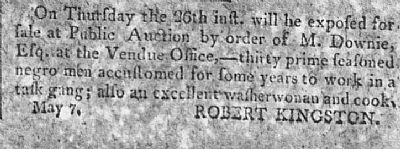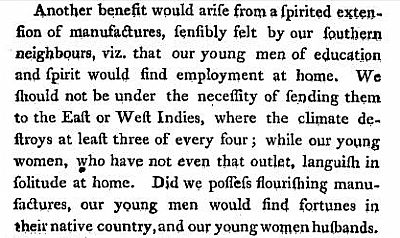Hector, Charles, Murdo (Murdoch) & John Downie
For family tree see Downie on Ancestry (subscription required)
Thanks to Ian Downie for his extensive help with the Downies in Guyana.
Rev John Downie [1727-1811] was parish minister of Stornoway and then of Urray (Ross-shire). His family became extensively involved in Guyana.
Rev Alexander Downie (1765–1820) was the eldest son of Rev John Downie. See below for his son John Downie (1797–1853), a colonial judge in Guayana.
Murdo Downie (1768–1818), the second son of Rev John Downie, was the first of the family to go to Guiana, as a land surveyor in 1802. According to Peter Fairbairn, writing to Lord Seaforth, Murdo's prospects were not good and he went on to Trinidad [NAS GD46/17/21]. He was back in Demerara by 1806, running a store in Stabroek. In 1808 he sold the business and returned to his profession as a land surveyor. [Essequebo & Demerara Gazette, various editions.] He made a donation to Inverness Academy of ten guineas in 1814. In May 1816 he left the colony, accompanied by one servant (presumaby enslaved), and died in Barbados in 1818 [Gentleman's Magazine].
Murdo had ealier established himself as a writer (lawyer) in Dingwall, where in 1795 he married Mary Grant, daugher of Dr Robert Grant of Inverness. A son was born in November 1797 but Mary died a year later. On 21 December 1799 Mary's sister, Ann, gave birth to a male child, which was clearly Murdo's. The baby was put in a basket, left on a doorstep, and later died. Murdo was tried and acquitted of murder but convicted of conspiring to expose an infant child, and served 9 months in the tolbooth of Inverness. [NAS JC26/1800/16 & HO 47/25/39] He had married Ann, in London, although a marriage to a deceased wife's sister was illegal.
In 1805 Mrs Robertson of Kiltearn reported the death of Annie Grant 'carried of by a fever at Demerary' [NLS MS 19331 f109 Mrs Anne Robertson, Kiltearn, to her daughter Christian (Mrs Watson), Crant it, Orkney. 9 October 1805.] He had had every reason to leave the country for Guyana.

Essequebo and Demnerary Royal Gazette, 7 May 1815
Charles Downie (1770–1805), the third surviving son of Rev John Downie, became captain of the ship Elbe (part of the fleet owned by Sandbach and Parker) and died on board the vessel in 1805. 'Mr Sandbach laments him. He was a fine young fellow and doted on by his family.' [NLS MS 19331 f109Mrs Anne Robertson, Kiltearn, to her daughter Christian (Mrs Watson), Crantit, Orkney. 9 Oct 1805.]
George Downie (1778–1814, the fourth surviving son of Rev John Downie, joined the Royal Navy as a midshipman and rose to the rank of Captain. He was killed in a naval battle at Lake Champlain during the British–American War of 1814. An extensive obituary was published in the Berbice Gazette, reflecting his family's connections with Guyana.
Hector Downie [4 Apr 1783–1844] was the youngest son of Rev John Downie [1727-1811], parish minister of Urray (Ross-shire). In September 1807 Mrs Robertson wrote from the manse at Kiltearn: 'We lately saw a Mr Hector Downie here from Demerary youngest to Mr Downie, Urray, a fine young man & very intimate with our friends.' [NLS MS 19331 f123 Anne Robertson, Kiltearn, to her daughter Christian (Mrs Watson), Crantit, Orkney, 9 Sept 1807]
Hector Downie married Elizabeth Jane Barry, widow of Archibald Johnstone, a doctor in the colony. In 1810 she visited the manse at Kiltearn, along with the 'Balcony family'. She was a slave-holder in her own right, with her husband acting as attorney [see 1819 Slave Register]. Downie became an army captain, later lived in Rothesay, and died there on 8 November 1844. [PROB11/2008/f351 Will of Hector Downie Esq; Caledonian Mercury Thu 21 Nov 1844 page 3].
In 1819 Hector Downie registered 61 enslaved people on Plantation Retreat 'situate on the west sea coast' of Berbice as attorney of Mrs Elizabeth Jane Downie. The estate was put up to auction in 1827, when Hector Downie was 'nomine uxoris' for Mrs Elizabeth Jane Downie nee Barry, formerly relict of Archibald Johnston deceased.
In his will Hector Downie, Captain on Halfpay of Her Majesty's 11th Regiment of Foot, proved 07/12/1844, provided for his stepson Archibald Johnston, a lunatic in an asylum in Aberdeen (to whom he owed £500 invested in the Blackwall Railway debentures, interest from which together with sums from his own purse supported Archibald Johnston). He left the balance of his estate to his nephew Sir Alexander Mackenzie Downie (son of his brother Rev Alexander Downie) at present residing at Frankfurt on the Maine, who was also appointed executor alongside 'my most valued friend' Alexander Denoon merchant of London and William Munro MD of Inverness. In 1825 Hector Downie had registered 9 enslaved people in his own name: of the previous 18 enslaved people he had registered, 3 had died and six been sold.
John Downie [1797-53], was the son of Rev Alexander Downie (above). He joined the Royal Navy as a midshipman and served under his uncle Captain George Downie (above)before training as a lawyer. He went on to be appointed principal judge of British Guiana in 1844 [London Gazette Issue 20394 page 3519]. However, In 1850 he resigned his position and left the colony after he was accused of being the author of an anonymous attack in the press on the attorney general of the colony. [Guiana Morning Chronicle Thursday 26 December 1850 page 3].
In his will [PROB 11: Quire Numbers 501-550], he left money to the children of his brother Rev Charles Downie, now minister of Urray.

In 1797 John Downie, minister of Urray, wrote Hints Towards the Improvement of the Counties of Ross and Cromarty (extract above from p26)

